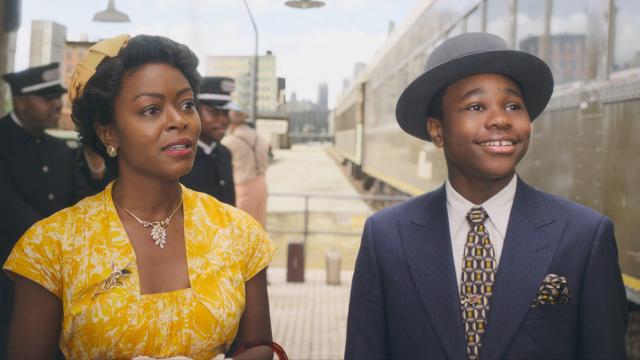
There are at least two faces in Chinonye Chukwu's Till that I expect will stay with me forever. Both belong to Emmett Till, the 14-year-old black teen who was killed in a lynching more than 60 years ago. Living in flashes of time that are slowed to a disquieting pitch, Till is represented best by Emmett’s expressions, both in death and in life, and in how people reacted to them – from his loving mother to the hate-filled white murderers who kidnapped him. And it’s in these expressions and reactions that the film will stay, for me and hopefully for other viewers.
In the opening scene, Mamie Till is driving her son Emmett to a department store, both of them singing to the radio along the way. The camera points up at them, from the floorboard, moving from one to the other, giving a rich glimpse of their relationship and their love, as light comes through the car and shines from behind. At the end of the scene, Mamie’s expression goes from cheeriness to concern in a slow flash. It’s almost as if she’s having a premonition.
Resting primarily on the sheer will of Mamie, played in the film by Danielle Deadwyler, Till plays as no standard biopic fare, nor as a piece of exploitation taking a real story of real pain for cheap tears. Comparisons can and should be drawn to Ava DuVernay’s Selma, another powerhouse of a production; the civil and voting rights fight at that movie’s center couldn’t have happened when and how it did without Mamie Till’s demand for justice.
That demand would only come back around earlier this year when a federal anti-lynching bill – named after Emmett Till – finally passed Congress and was signed into law, a fact that’s pointed out in bold letters at the end of the film.
Jalyn Hall, as Emmett Till, is the one whose expressiveness I’ll forever associate with this film. The first example of this comes in the form of Till’s lifeless body, revealed in shocking detail for how he was brutalized and beaten. The image is at an angle and obscured a little, but the impression is as clear as daylight. Mamie requests an open-casket funeral, after what is surely Till’s most devastating sequence. It’s hard to watch, and must only have been unimaginably harder for the real life Mamie.
But that is not the sole face of the film that I take with me. This too belongs to Hall’s representation of Emmett when he boards his train to Mississippi. He looks back at his mother, smiling and waving goodbye, with wide eyes and the widest possible smile. Hall brings a bright, happy-go-lucky spirit to a film with horror at its center, speaking to the director’s commitment to start from, and end in, a place of joy. There’s sadness and trauma throughout Till, but also there’s this light – literally and figuratively felt – that shines on Mamie, on Emmett, and on the team of black activists that join the fight for justice (including one Medgar Evers, whose appearance made me smile and cry).
Till is not a film of torture and death but, as its filmmaker has clearly stated in interviews, the movie is concerned with life and joy, and returns to those two from unimaginable trauma. The murder of Emmett is never shown on screen, and rightfully so; only his kidnapping is confronted and some far off noises are heard. It would be a massive challenge for anyone to move forward with this story and include such detailed horror from the start, but Chukwu manages the task by concentrating on Mamie’s observations and feelings. From Emmett’s train departure to Mamie’s return home, it’s all told from the mother’s perspective; the body identification, the press and media, the meeting with black activists, and the trial in Mississippi.
Deadwyler is transcendent in her stoic and statement-making performance. Sure, it’s bolstered and strengthened by director Chukwu’s style, but only because she observed something deeper in Deadwyler’s Mamie. This depth can best be seen in the courtroom scenes, where Mamie is preyed upon by Mississippi law officials who are attempting to intimidate and humiliate her. On the record, she testifies as to her son’s identification, and is then cross-examined with irrelevant questions that are meant to make her upset. Deadwyler doesn’t hold back Mamie’s disgust for what’s happening, but balances those emotions with her chin up and her soul-piercing eyes staring straight ahead. She’s an absolute force of nature.
Unquestionably memorable, Till breaks the traditional biopic mold through perspective and persistence by way of a mother’s journey. Any deviation to other characters would have been mere diversions that brought generic broadness to what should be a personal story. A movie that starts and ends with a smile, in spite of everything that occurs in between, isn’t just one director’s attempt to create a work that gets seen by as many people as possible.
It also makes a point about what we, as humans, allow ourselves to feel about each other. An expression like that is worth more than the price of a ticket.
RATING: 4/5
Bill Arceneaux is an independent film critic from New Orleans. Follow him on Twitter at @billreviews and subscribe to his newsletter at www.moviegoing.rocks















